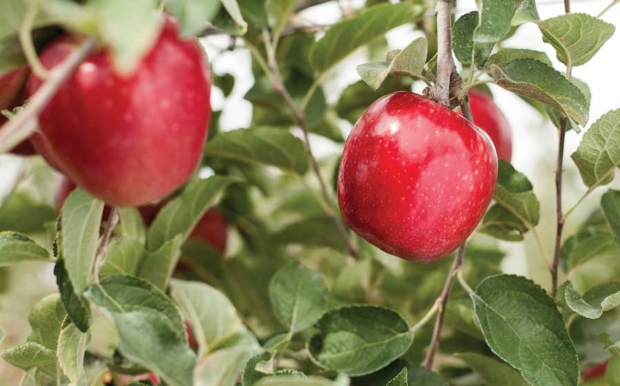
WA 38 during a pre-harvest preview of the variety in Prosser, Washington on September 17, 2014. (TJ Mullinax/Good Fruit Grower)
The first plantings of the new apple variety developed by Washington State University — WA 38, which has the brand name Cosmic Crisp — are just around the corner, yet growers still have plenty of questions about how to get trees, if budwood will be available and what the rules are for propagating it.
Proprietary Variety Management (PVM), the company managing the WA 38 rollout for WSU, recently released a summary of policies for producing and distributing it, as well as new rules for propagation.
WA 38 sales are being handled by the Northwest Nursery Improvement Institute (NNII), the collective of nurseries propagating the variety for release to growers.
Here are answers to a few of the more commonly asked questions, according to the new WA 38 propagation policy:
—When can growers begin planting WA 38?
Only growers who won a lottery to plant the first commercially available trees — an estimated 700,000 — may plant trees in 2017. In addition, no budwood will be available for propagation that year, as nurseries work to increase production of finished trees to meet high demand.
Nurseries indicate there are 2018 orders for about 2 million trees, and the number may increase through the budding season that ends in September. Growers who want to plant WA 38 in 2018 or beyond should contact participating nurseries to place an order.
—Can growers buy trees from any nursery?
A nursery must be sub-licensed by NNII to propagate, grow and sell WA 38 to growers for planting in Washington. Currently, these include only NNII member nurseries: Biringer Nursery, Brandt’s Fruit Trees, C & O Nursery, Cameron Nursery, Gold Crown Nursery, ProTree Nursery, Van Well Nursery and Willow Drive Nursery.
—Will budwood for topworking or grafting be available?
Participating nurseries are expected to have some extra certified virus-tested budwood available in some years, which will be made available for propagation.
First priority will be to other NNII nurseries for fall, spring or bench graft propagation, then to contracted WA 38 growers for topworking, though topworking is not allowed until 2018.
Finally, if there is still budwood available, it will go to growers for budding of rootstock liners or bench grafts.
Budwood production, collection and distribution costs are at the discretion of the nursery.
—Can a grower propagate WA 38?
Fruit grower topworking and tree production, through budding of rootstock liners or bench grafts, is permitted under certain circumstances.
However, topworking will not be allowed until 2018, and then will only be permitted when member nurseries have excess wood on Nov. 1 of the previous year.
Tree production, through budding of rootstock liners or bench grafts, will only be possible when the participating nurseries are unable to deliver trees to meet demand.
Trees for propagation can be produced by the grower or a third party, but are only for the contracted fruit grower’s own orchards.
Fruit growers are only allowed to grow or to have trees grown for their licensed allocation at a site that is identified in their agreement with NNII. •
– by Shannon Dininny
ONLINE
For more information about the WA 38 license agreements, royalties and to see the policy, visit www.cosmiccrisp.com






Leave A Comment